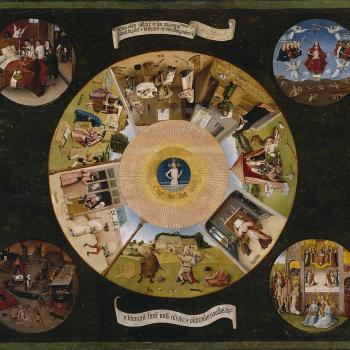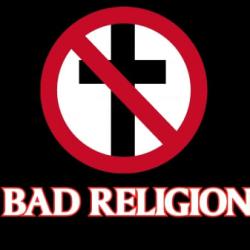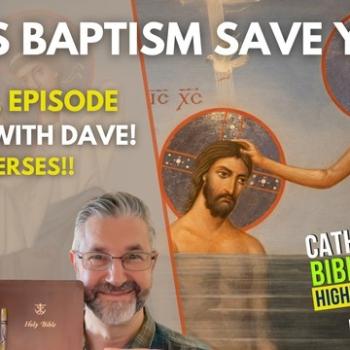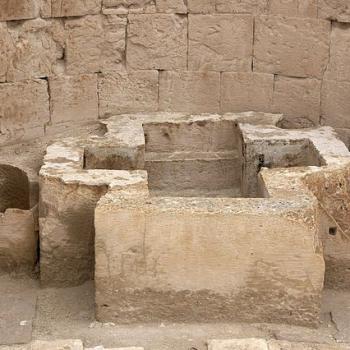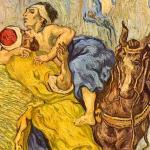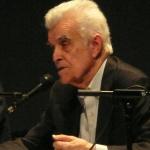(vs. C. Michael Patton)

Sermon on the Mount (c. 1912), by Rudolf Yelin der Ältere (1864-1940) [public domain / Wikimedia Commons]
***
***
This is a response to Calvinist evangelical C. Michael Patton’s article, Why I Don’t Buy the Roman Catholic Interpretation of John 6 in Defense of Transubstantiation (6 June 2008). His words (cited in their entirety) will be in blue.
* * * * *
Catholic apologetics is more robust today than it has been in the recent past.
I completely agree!
Since Rome has given more freedom of exploration and discover[y] along with the encouragement for Catholics to study the Scriptures,
For well over a hundred years (at least since Pope Leo XIII: 1878-1903), the Church has encouraged intense personal Bible study; it’s nothing new. G. K. Chesterton died in 1936, and he was known to do some apologetics. The influx of converts into the Church after Cardinal Newman’s conversion also gave impetus to lay apologetics: and that is 150 years ago. But I don’t want to quibble too much . . .
I think it can be done in a brotherly manner: an “in-house dispute”: as opposed to a struggle between good and evil, or light and dark, or Christians vs. unregenerate pagans and idolaters, as our anti-Catholic Protestant brethren would have us believe it is. That’s what I appreciate about the exchanges I have had with Michael. He does apologetics the right way. Though we often have honest disagreements, I have great respect for that and for him as a person.
One of the key differences between Protestants and Catholics through the years is the view of the Lord’s Supper or the Eucharist. Catholics, along with the Orthodox Church, have traditionally believed that the Eucharist represents the centerpiece of our worship to God.
So would Lutherans and Anglicans and (I think) Methodists, as well. C. S. Lewis, for example (Anglican), would have affirmed this.
*
Luther’s and Lutheranism’s view also holds that “the bread and the wine literally turn into the body and blood of Christ.” The only difference is that they think the bread and wine are present alongside the Body and Blood. But it is still Real, Substantial Presence. The fact that the founder of Protestantism continued to believe this (as well as several other brands of Protestants) shows that it is not simply a “Catholic thing.” It is a dispute that runs across various strains of Christendom. I never fail to point that out, just as a matter of fact.
Why is this important? Because historic Protestantism has often charged the Catholic church with idolatry, believing that they have turned God into an idol of bread and wine, worshiping the elements without, indeed, contrary to, a scriptural basis.
. . . which is an utterly wrongheaded criticism, as I have often argued, since idolatry, by definition, is a matter of the heart and interior disposition. No minimally informed Catholic has ever worshiped mere bread and wine (just as none have been dumb and absurd enough to actually venerate plaster in the form of a statue of a saint). We are worshiping Jesus Christ present in what was formerly bread and wine. Obviously, other Christians may deny the fact of what we believe in faith to be taking place, but whatever the Mass is, it is not idolatry, which is worship of what is not God and raising something other than God to His sole place of supreme exaltation.
Clearly, Catholics aren’t doing that (and note that Michael is not himself making this charge, but reporting that it has often taken place), which is simple to see in the literal meaning of the word transubstantiation: “change of substance.” Think about it for a moment in this light: how does the following “logic:” of our anti-Catholic critics make any sense?:
1) Catholics believe in transubstantiation.
2) Transubstantiation means, literally, “change of substance.”
3) In this instance the substance change involves bread and wine being transformed into the Body and Blood of Jesus Christ.
4) Therefore, Catholics believe that bread and wine are no longer present; only the Body and Blood of Christ.
5) And the adoration of the host and eucharistic worship takes place after the consecration and change of substance in the Mass.
6) Nevertheless, we will accuse Catholics of worshiping bread and wine instead of Jesus Christ, which is gross idolatry, and no part of legitimate Christianity.
Obviously, #6 doesn’t follow, based on the premises of #2-#5. So how is it we get accused of idolatry, when the very word that describes the practice being so critiqued proves that it is not taking place at all? If anything, Lutheranism would be more open to this accusation, on the grounds that they might conceivably confuse the elements with Jesus (I would not make the charge myself, I hasten to add, but I am making an observation based on anti-Catholic premises). But that is not true in our case, by the fundamental definition of a complete change taking place, as we believe. So again, one can disagree with what Catholics (with virtually unanimous patristic support) believe in faith to be occurring, but it is ludicrous — utterly illogical — to accuse us of idolatry.
Catholics, on the other hand (and this is important), have elevated the celebration of the Mass and the belief in Transubstantiation to an essential of Christianity.
Just as the Church fathers and Jesus and the apostles did . . .
*
For a professed, formal Catholic, yes. It is incorrect to contend that we would say of any Protestant that they are in “great danger” of hell for not going to Mass, because that only applies to practicing Catholics. And that also has a lot to do with the notion of the importance of corporate worship, or the “Sabbath principle” as well as the overriding importance and supreme honor of receiving our Lord in the Eucharist, just as Mary received Him in her womb and the world received Him in the Incarnation.
With the recent rise of modern Catholic apologetics, Catholic lay people are being trained to answer some of the more difficult objections to their faith that Protestants bring forward.
Yep. I would flip the challenge back to Michael, too, by turning the tables:
With the recent rise of modern Protestant apologetics, Protestant lay people are being trained to answer some of the more difficult objections to their faith that Catholics bring forward.
I simply can’t resist: I recently replied in great depth (six parts) to Michael’s series defending sola Scriptura, but haven’t heard a peep back from either Michael or any of his regular blog commenters. So that works both ways. Protestants (not just we Catholics) have lots of “difficult objections” to Protestantism to adequately defend and explain as well (and often they take a pass from doing so). Sola Scriptura is very much one of these.
The two primary areas that Catholic apologetics is centering on are issues with the canon of Scripture and the doctrine of Transubstantiation.
I don’t know if they are primary to the exclusion of other things. But the Catholic understanding of the Eucharist is receiving a vigorous defense; that’s definitely true.
*
 “I am the bread of life. 49 Your fathers ate the manna in the wilderness, and they died. 50 This is the bread that comes down from heaven, so that one may eat of it and not die. 51 I am the living bread that came down from heaven. If anyone eats of this bread, he will live forever. And the bread that I will give for the life of the world is my flesh.” 52 The Jews then disputed among themselves, saying, “How can this man give us his flesh to eat?” 53 So Jesus said to them, “Truly, truly, I say to you, unless you eat the flesh of the Son of Man and drink his blood, you have no life in you. 54 Whoever feeds on my flesh and drinks my blood has eternal life, and I will raise him up on the last day. 55 For my flesh is true food, and my blood is true drink. 56 Whoever feeds on my flesh and drinks my blood abides in me, and I in him. 57 As the living Father sent me, and I live because of the Father, so whoever feeds on me, he also will live because of me. 58 This is the bread that came down from heaven, not as the fathers ate and died. Whoever feeds on this bread will live forever.” 59 Jesus said these things in the synagogue, as he taught at Capernaum. 60 When many of his disciples heard it, they said, “This is a hard saying; who can listen to it?” 61 But Jesus, knowing in himself that his disciples were grumbling about this, said to them, “Do you take offense at this? . . . After this many of his disciples turned back and no longer walked with him.”
“I am the bread of life. 49 Your fathers ate the manna in the wilderness, and they died. 50 This is the bread that comes down from heaven, so that one may eat of it and not die. 51 I am the living bread that came down from heaven. If anyone eats of this bread, he will live forever. And the bread that I will give for the life of the world is my flesh.” 52 The Jews then disputed among themselves, saying, “How can this man give us his flesh to eat?” 53 So Jesus said to them, “Truly, truly, I say to you, unless you eat the flesh of the Son of Man and drink his blood, you have no life in you. 54 Whoever feeds on my flesh and drinks my blood has eternal life, and I will raise him up on the last day. 55 For my flesh is true food, and my blood is true drink. 56 Whoever feeds on my flesh and drinks my blood abides in me, and I in him. 57 As the living Father sent me, and I live because of the Father, so whoever feeds on me, he also will live because of me. 58 This is the bread that came down from heaven, not as the fathers ate and died. Whoever feeds on this bread will live forever.” 59 Jesus said these things in the synagogue, as he taught at Capernaum. 60 When many of his disciples heard it, they said, “This is a hard saying; who can listen to it?” 61 But Jesus, knowing in himself that his disciples were grumbling about this, said to them, “Do you take offense at this? . . . After this many of his disciples turned back and no longer walked with him.”*
That’s a fair description, yes. But there are many more sub-arguments beyond this bald presentation of “literal” interpretation. I will get into some of those as I answer, and as opportunity arises.
Karl Keating, a popular Catholic Apologist and President of Catholic Answers, [link] says:
“There was no attempt to soften what was said, no attempt to correct misunderstanding, for there were none. His listeners understood him quite well. No one any longer thought he was speaking metaphorically. If they had, why no correction? On other occasions, whenever there was confusion, Christ explained what he meant. Here, where any misunderstanding would be catastrophic, there was no effort to correct. Instead, he repeated what he said” (Karl Keating, Catholicism and Fundamentalism, [San Francisco: Ignatius, 1988], 233-234).
Amen! Preach it, Karl!
*
Okay. Now we will see how the counter-argument stands up under scrutiny. That is the intellectual challenge that I love about apologetics. Our views can assuredly withstand scrutiny, again and again. I see it daily in my work, and that is one reason I never flee from challenges to the Catholic faith from intelligent, cordial Protestant critics like Michael Patton. I welcome them. Bring ’em on! The more the merrier . . .
*
To the contrary, there are indeed instances of this in John. One occurs in John 10:1-19. Jesus gives a parable of the sheep and the good shepherd (10:1-5). Then in verses 6 and 7b we read:
This figure [paroimia; “parable” in KJV] Jesus used with them, but they did not understand what he was saying to them. So Jesus again said to them,. . . (RSV)
Then Jesus goes on to expound and clarify and elaborate (10:7b-18). He doesn’t merely repeat for emphasis, as in John 6. Therefore, this is a counter-example. Another one is the entire chapter 16 of John, where the disciples did not understand, and Jesus explained at length to clarify, and then they did understand:
[1] “I have said all this to you to keep you from falling away.[2] They will put you out of the synagogues; indeed, the hour is coming when whoever kills you will think he is offering service to God. [3] And they will do this because they have not known the Father, nor me. [4] But I have said these things to you, that when their hour comes you may remember that I told you of them. “I did not say these things to you from the beginning, because I was with you. [5] But now I am going to him who sent me; yet none of you asks me, `Where are you going?’ [6] But because I have said these things to you, sorrow has filled your hearts. [7] Nevertheless I tell you the truth: it is to your advantage that I go away, for if I do not go away, the Counselor will not come to you; but if I go, I will send him to you. [8] And when he comes, he will convince the world concerning sin and righteousness and judgment: [9] concerning sin, because they do not believe in me; [10] concerning righteousness, because I go to the Father, and you will see me no more; [11] concerning judgment, because the ruler of this world is judged. [12] “I have yet many things to say to you, but you cannot bear them now. [13] When the Spirit of truth comes, he will guide you into all the truth; for he will not speak on his own authority, but whatever he hears he will speak, and he will declare to you the things that are to come. [14] He will glorify me, for he will take what is mine and declare it to you. [15] All that the Father has is mine; therefore I said that he will take what is mine and declare it to you. [16] A little while, and you will see me no more; again a little while, and you will see me.” [17] Some of his disciples said to one another, “What is this that he says to us, `A little while, and you will not see me, and again a little while, and you will see me’; and, `because I go to the Father’?” [18] They said, “What does he mean by `a little while’? We do not know what he means.” [19] Jesus knew that they wanted to ask him; so he said to them, “Is this what you are asking yourselves, what I meant by saying, `A little while, and you will not see me, and again a little while, and you will see me’? [20] Truly, truly, I say to you, you will weep and lament, but the world will rejoice; you will be sorrowful, but your sorrow will turn into joy. [21] When a woman is in travail she has sorrow, because her hour has come; but when she is delivered of the child, she no longer remembers the anguish, for joy that a child is born into the world. [22] So you have sorrow now, but I will see you again and your hearts will rejoice, and no one will take your joy from you. [23] In that day you will ask nothing of me. Truly, truly, I say to you, if you ask anything of the Father, he will give it to you in my name. [24] Hitherto you have asked nothing in my name; ask, and you will receive, that your joy may be full. [25] “I have said this to you in figures; the hour is coming when I shall no longer speak to you in figures but tell you plainly of the Father. [26] In that day you will ask in my name; and I do not say to you that I shall pray the Father for you; [27] for the Father himself loves you, because you have loved me and have believed that I came from the Father. [28] I came from the Father and have come into the world; again, I am leaving the world and going to the Father.” [29] His disciples said, “Ah, now you are speaking plainly, not in any figure! [30] Now we know that you know all things, and need none to question you; by this we believe that you came from God.” [31] Jesus answered them, “Do you now believe? [32] The hour is coming, indeed it has come, when you will be scattered, every man to his home, and will leave me alone; yet I am not alone, for the Father is with me. [33] I have said this to you, that in me you may have peace. In the world you have tribulation; but be of good cheer, I have overcome the world.”
This is, then, a second counter-instance of Jesus explaining to His disciples when they didn’t properly comprehend or were confused or troubled. With an entire chapter devoted to such an instance, we can hardly deny that the Gospel of John contains this motif. Jesus would explain things to His disciples (if not always to the masses or the hyper-skeptical Pharisees). And in John 6 it was disciples who were questioning:
[60] Many of his disciples, when they heard it, said, “This is a hard saying; who can listen to it?” [61] But Jesus, knowing in himself that his disciples murmured at it, said to them, “Do you take offense at this?. . . [66] After this many of his disciples drew back and no longer went about with him.
Yet there Jesus did not explain; He merely repeated with more “in your face” force. And it is the only recorded instance (other than Judas) of any of His disciples ceasing to follow Him. The plausible reason is because He knew that they were questioning and would not have accepted any further explanation anyway. We know this from the hard evidence of John 6:64:
“But there are some of you that do not believe.” For Jesus knew from the first who those were that did not believe, and who it was that would betray him.
This theme appears elsewhere in John, too:
John 8:27, 43-47 They [the Pharisees] did not understand that he spoke to them of the Father. . . . [43] Why do you not understand what I say? It is because you cannot bear to hear my word. [44] You are of your father the devil, and your will is to do your father’s desires. He was a murderer from the beginning, and has nothing to do with the truth, because there is no truth in him. When he lies, he speaks according to his own nature, for he is a liar and the father of lies. [45] But, because I tell the truth, you do not believe me. [46] Which of you convicts me of sin? If I tell the truth, why do you not believe me? [47] He who is of God hears the words of God; the reason why you do not hear them is that you are not of God.”
John 12:37-40 Though he had done so many signs before them, yet they did not believe in him; [38] it was that the word spoken by the prophet Isaiah might be fulfilled: “Lord, who has believed our report, and to whom has the arm of the Lord been revealed?” [39] Therefore they could not believe. For Isaiah again said, [40] “He has blinded their eyes and hardened their heart, lest they should see with their eyes and perceive with their heart, and turn for me to heal them.”
In other words, Jesus is emphasizing that some people don’t “understand” because they don’t want to: they lack faith; they can’t “bear” His word, and they are burdened with undue skepticism and led by the devil, the father of lies. This is what happened in John 6 with those disciples who left Him. It is a theme in the Synoptics as well:
Matthew 13:13, 19 This is why I speak to them in parables, because seeing they do not see, and hearing they do not hear, nor do they understand. . . . When any one hears the word of the kingdom and does not understand it, the evil one comes and snatches away what is sown in his heart; this is what was sown along the path.
Luke 5:21-22 And the scribes and the Pharisees began to question, saying, “Who is this that speaks blasphemies? Who can forgive sins but God only?” [22] When Jesus perceived their questionings, he answered them, “Why do you question in your hearts?”
A third instance in the Gospel of John of Jesus explaining something in greater detail, that was misunderstood (which Michael thinks is rare) occurs in John 3:1-15: the incident with Nicodemus regarding the meaning of “born again”. Nicodemus asks: “How can a man be born when he is old? Can he enter a second time into his mother’s womb and be born?” (3:4). Jesus explains His meaning (3:5-8). Nicodemus, still baffled, again asks: “How can this be?”(3:9). Jesus replied: “Are you a teacher of Israel, and yet you do not understand this?” (3:10) and then proceeds to explain some more (3:11-15). He explained because He knew that Nicodemus was truly seeking. When someone wasn’t seeking or open in their spirit, He usually (if not always) would not do so, as in John 6.
But John is not the only account of Jesus’ life and teachings; we also have the three synoptic gospels, and they record more instances of Jesus explaining to His disciples when they didn’t understand something (or descriptions of same):
Matthew 13:36b, 51 And his disciples came to him, saying, “Explain to us the parable of the weeds of the field.” . . . “Have you understood all this?” They said to him, “Yes.”
Matthew 15:10-20 And he called the people to him and said to them, “Hear and understand: [11] not what goes into the mouth defiles a man, but what comes out of the mouth, this defiles a man.” [12] Then the disciples came and said to him, “Do you know that the Pharisees were offended when they heard this saying?” [13] He answered, “Every plant which my heavenly Father has not planted will be rooted up. [14] Let them alone; they are blind guides. And if a blind man leads a blind man, both will fall into a pit.” [15] But Peter said to him, “Explain the parable to us.” [16] And he said, “Are you also still without understanding? [17] Do you not see that whatever goes into the mouth passes into the stomach, and so passes on? [18] But what comes out of the mouth proceeds from the heart, and this defiles a man. [19] For out of the heart come evil thoughts, murder, adultery, fornication, theft, false witness, slander. [20] These are what defile a man; but to eat with unwashed hands does not defile a man.” [cf. Mark 7:17-18]
Matthew 16:5-12 When the disciples reached the other side, they had forgotten to bring any bread. [6] Jesus said to them, “Take heed and beware of the leaven of the Pharisees and Sad’ducees.” [7] And they discussed it among themselves, saying, “We brought no bread.” [8] But Jesus, aware of this, said, “O men of little faith, why do you discuss among yourselves the fact that you have no bread? [9] Do you not yet perceive? Do you not remember the five loaves of the five thousand, and how many baskets you gathered? [10] Or the seven loaves of the four thousand, and how many baskets you gathered? [11] How is it that you fail to perceive that I did not speak about bread? Beware of the leaven of the Pharisees and Sad’ducees.” [12] Then they understood that he did not tell them to beware of the leaven of bread, but of the teaching of the Pharisees and Sad’ducees.
Matthew 17:9-13 And as they were coming down the mountain, Jesus commanded them, “Tell no one the vision, until the Son of man is raised from the dead.” [10] And the disciples asked him, “Then why do the scribes say that first Eli’jah must come?” [11] He replied, “Eli’jah does come, and he is to restore all things; [12] but I tell you that Eli’jah has already come, and they did not know him, but did to him whatever they pleased. So also the Son of man will suffer at their hands.” [13] Then the disciples understood that he was speaking to them of John the Baptist.
Mark 4:33-34 With many such parables he spoke the word to them, as they were able to hear it; [34] he did not speak to them without a parable, but privately to his own disciples he explained everything.
[therefore, He would have in John 6 if a misunderstanding were involved, rather than a hardhearted disbelief, brought on by the influence of Satan]
Luke 8:9-11 And when his disciples asked him what this parable meant, [10] he said, “To you it has been given to know the secrets of the kingdom of God; but for others they are in parables, so that seeing they may not see, and hearing they may not understand. [11] Now the parable is this: The seed is the word of God.
[Jesus continues to explain in 8:12-15]
Luke 9:46-48 And an argument arose among them as to which of them was the greatest. [47] But when Jesus perceived the thought of their hearts, he took a child and put him by his side, [48] and said to them, “Whoever receives this child in my name receives me, and whoever receives me receives him who sent me; for he who is least among you all is the one who is great.”
Luke 24:13-27 That very day two of them were going to a village named Emma’us, about seven miles from Jerusalem, [14] and talking with each other about all these things that had happened. [15] While they were talking and discussing together, Jesus himself drew near and went with them. [16] But their eyes were kept from recognizing him. [17] And he said to them, “What is this conversation which you are holding with each other as you walk?” And they stood still, looking sad. [18] Then one of them, named Cle’opas, answered him, “Are you the only visitor to Jerusalem who does not know the things that have happened there in these days?” [19] And he said to them, “What things?” And they said to him, “Concerning Jesus of Nazareth, who was a prophet mighty in deed and word before God and all the people, [20] and how our chief priests and rulers delivered him up to be condemned to death, and crucified him. [21] But we had hoped that he was the one to redeem Israel. Yes, and besides all this, it is now the third day since this happened. [22] Moreover, some women of our company amazed us. They were at the tomb early in the morning [23] and did not find his body; and they came back saying that they had even seen a vision of angels, who said that he was alive. [24] Some of those who were with us went to the tomb, and found it just as the women had said; but him they did not see.” [25] And he said to them, “O foolish men, and slow of heart to believe all that the prophets have spoken! [26] Was it not necessary that the Christ should suffer these things and enter into his glory?”[27] And beginning with Moses and all the prophets, he interpreted to them in all the scriptures the things concerning himself.
The people in John 6 were looking for Christ to provide for them like Moses did and they were not interested in His talk about belief and eating his flesh. Some naturally thought that he was being literal about his statements. It is true, Christ did not correct them. But this is a common theme in the ministry of Christ.
I think the scriptural data highlighted above shows this to be a false statement. He often explained and corrected His disciples Who misunderstood and who were willing to listen. Therefore, John 6 makes sense only in terms of interpreting it as an instance where it was not an innocent misunderstanding (mistaking a supposed figurative discourse for a literal one) , but a deliberate refusal to believe (understanding but not accepting). These were disciples who would have had the teaching explained to them in greater detail if only they were willing. They were not, and the difficulty of this teaching was enough to make them split for good. Many Protestants today believe the same thing that made these former disciples forsake the following of Jesus.
As Peter demonstrates, it is only those who stay with him that get the answers for eternal life (John 6:68 ).
).
But this simply proves my point. They left precisely because they refused to believe Jesus. If it had been a misunderstanding, Jesus certainly would have explained to them, had they been open. His not explaining proves that it was a refusal to believe what was made quite plain (His literal Body and Blood in a eucharistic context).
Often Christ would speak in parables and not tell any but those who were His true followers (Luke 8:10 ). The rest He let go in their ignorance since he knew all men and he was not committing himself to them.
). The rest He let go in their ignorance since he knew all men and he was not committing himself to them.
I agree. That interpretation was incorporated into my argument above; therefore has no effect in supposedly defeating my argument.
John presents this side of Jesus more than any other of the Gospels when he says: John 2:24-25 “But Jesus, on His part, was not entrusting Himself to them, for He knew all men, and because He did not need anyone to testify concerning man, for He Himself knew what was in man.” He did not entrust himself to his listeners.
“But Jesus, on His part, was not entrusting Himself to them, for He knew all men, and because He did not need anyone to testify concerning man, for He Himself knew what was in man.” He did not entrust himself to his listeners.
This passage is referring specifically to those who believed because “they saw the signs which he did” (2:23). The passage that immediately follows is the one with Nicodemus inquiring about being “born again.” Nicodemus was, I suppose, a “follower” but not a disciple. He was a Pharisee.
Why? I suppose some wanted a king who would provide literal food for them like Moses did in the wilderness and they left when it became clear that He was not going to do the same. Some thought that He was speaking about actually eating his flesh and blood, [in] violation of the Mosaic Law, and they left. But why didn’t He simply correct their misunderstanding in this case? For the same reason He does not throughout the book of John.
But I have already provided three examples (including the entire chapter 16) where Jesus did indeed correct misunderstandings or explain further. I provide three additional ones below, for a total of six prooftexts in John. And we know this was His standard practice also from eight passages in the Synoptics that I presented above. That makes a total of 14 examples in the four Gospels. So Michael’s argument is based on a false presupposition or premise.
a. John 2:18-21 “The Jews then said to Him, ‘What sign do You show us as your authority for doing these things?’ Jesus answered them, ‘Destroy this temple, and in three days I will raise it up.’ The Jews then said, ‘It took forty-six years to build this temple, and will You raise it up in three days?’ But He was speaking of the temple of His body.”
“The Jews then said to Him, ‘What sign do You show us as your authority for doing these things?’ Jesus answered them, ‘Destroy this temple, and in three days I will raise it up.’ The Jews then said, ‘It took forty-six years to build this temple, and will You raise it up in three days?’ But He was speaking of the temple of His body.”
*
Exactly; because they did not want to believe Him. These were probably the scribes and Pharisees, because it was at the temple. This proves my point again, because my argument hinges on the clear distinction (which Michael himself has noted) between how Jesus talked to open-minded and closed-minded people, and between how He talked to disciples and the masses. As I wrote in my book, A Biblical Defense of Catholicism (p. 88):
. . . Jesus often put people “on the spot” and demanded decisive, self-denying allegiance (e.g., Matt. 10:34-39; 12:30; 19:21).
Here are those passages:
John 10:34-39 Do not think that I have come to bring peace on earth; I have not come to bring peace, but a sword. [35] For I have come to set a man against his father, and a daughter against her mother, and a daughter-in-law against her mother-in-law; [36] and a man’s foes will be those of his own household. [37] He who loves father or mother more than me is not worthy of me; and he who loves son or daughter more than me is not worthy of me; [38] and he who does not take his cross and follow me is not worthy of me. [39] He who finds his life will lose it, and he who loses his life for my sake will find it.
John 12:30 He who is not with me is against me, and he who does not gather with me scatters.
John 19:21 Jesus said to him, “If you would be perfect, go, sell what you possess and give to the poor, and you will have treasure in heaven; and come, follow me.”
Catholic apologist Bertrand L. Conway elaborates:
We must remember that Christ, like every good teacher, made two sorts of answers to men who objected to His teaching. If they did not understand His meaning, He explained His doctrine more fully. In this way He explains . . . the possibility of the rich man being saved (Matthew 19:24-6), the fact of Lazarus’ death (John 11:11-14), the idea of freedom (John 8:32-4; cf. John 4:31-4; 8:21-23). When His hearers understood His teaching but refused to accept it, He repeated His teaching with even more emphasis. Thus, He insisted upon His power to forgive sins, when the Scribes accused Him of blasphemy (Matthew 9:2-7), and insisted on His being Eternal, when the Jews said He was not yet fifty years old (John 8:56-8).
(The Question Box, New York: Paulist Press, 1929, 251; cited in my book: A Biblical Defense of Catholicism, pp. 88-89)
Here are the first set of passages, also, for the convenience of readers:
Matthew 19:24-26 Again I tell you, it is easier for a camel to go through the eye of a needle than for a rich man to enter the kingdom of God.” [25] When the disciples heard this they were greatly astonished, saying, “Who then can be saved?” [26] But Jesus looked at them and said to them, “With men this is impossible, but with God all things are possible.”
John 11:8-15 [8] The disciples said to him, “Rabbi, the Jews were but now seeking to stone you, and are you going there again?” [9] Jesus answered, “Are there not twelve hours in the day? If any one walks in the day, he does not stumble, because he sees the light of this world. [10] But if any one walks in the night, he stumbles, because the light is not in him.” [11] Thus he spoke, and then he said to them, “Our friend Laz’arus has fallen asleep, but I go to awake him out of sleep.” [12] The disciples said to him, “Lord, if he has fallen asleep, he will recover.” [13] Now Jesus had spoken of his death, but they thought that he meant taking rest in sleep. [14] Then Jesus told them plainly, “Laz’arus is dead; [15] and for your sake I am glad that I was not there, so that you may believe. But let us go to him.”
[a fourth instance in the Gospel of John, of Jesus explaining His meaning to the disciples, who had misunderstood Him]
John 4:31-34 Meanwhile the disciples besought him, saying, “Rabbi, eat.” [32] But he said to them, “I have food to eat of which you do not know.” [33] So the disciples said to one another, “Has any one brought him food?” [34] Jesus said to them, “My food is to do the will of him who sent me, and to accomplish his work.
[a fifth instance . . .]
John 8:21-32 Again he said to them, “I go away, and you will seek me and die in your sin; where I am going, you cannot come.” [22] Then said the Jews, “Will he kill himself, since he says, `Where I am going, you cannot come’?” [23] He said to them, “You are from below, I am from above; you are of this world, I am not of this world. [24] I told you that you would die in your sins, for you will die in your sins unless you believe that I am he.” [25] They said to him, “Who are you?” Jesus said to them, “Even what I have told you from the beginning. [26] I have much to say about you and much to judge; but he who sent me is true, and I declare to the world what I have heard from him.” [27] They did not understand that he spoke to them of the Father. [28] So Jesus said, “When you have lifted up the Son of man, then you will know that I am he, and that I do nothing on my own authority but speak thus as the Father taught me. [29] And he who sent me is with me; he has not left me alone, for I always do what is pleasing to him.”[30] As he spoke thus, many believed in him. [31] Jesus then said to the Jews who had believed in him, “If you continue in my word, you are truly my disciples, [32] and you will know the truth, and the truth will make you free.”
[a sixth instance . . .]
b. John 3:3-4 “Jesus answered and said to him, ‘Truly, truly, I say to you, unless one is born again he cannot see the kingdom of God.’ Nicodemus said to Him, ‘How can a man be born when he is old? He cannot enter a second time into his mother’s womb and be born, can he?”
“Jesus answered and said to him, ‘Truly, truly, I say to you, unless one is born again he cannot see the kingdom of God.’ Nicodemus said to Him, ‘How can a man be born when he is old? He cannot enter a second time into his mother’s womb and be born, can he?”
*
I don’t understand this claim. Jesus did explain things to Nicodemus. No less than eight verses in the chapter are devoted to Jesus elaborating on his meaning, as I mentioned above. Yet Michael says that “Jesus does not correct Nicodemus’ misunderstanding.” Nor is it “obvious to the reader that this is not to be taken literally” with regard to John 6. It is so non-obvious that the entire mass of Church fathers believed in the Real Presence just as Catholics do, based partially on the evidence of John 6. It’s “obvious” to evangelical Protestants only because they have been taught over and over that the chapter is parabolic and not literal, and to not believe in the Real Presence in the first place. So “obvious” is quite a relative term: highly dependent on background thought, teaching, and presuppositions.
c. The disciples want Jesus to eat: “Rabbi, eat” (John 4:31 ). Jesus answers: “I have food to eat that you do not know about” (4:32). “So the disciples were saying to one another, ‘No one brought him anything to eat, did he?’” (John 4:33
). Jesus answers: “I have food to eat that you do not know about” (4:32). “So the disciples were saying to one another, ‘No one brought him anything to eat, did he?’” (John 4:33 ).
).
*
Again, this works at cross-purposes to Michael’s argument regarding John 6 because if this shows how Jesus reacts to misunderstood symbolism, then it supports the Catholic argument, since He would have also likely acted the same way towards the alleged misunderstandings of His words in the John 6 discourse. But He did not. He simply reiterated His teaching in even starker, stronger terms. So this proves nothing for Michael’s case against literalism in John 6. Other times, He is silent, as before Pontius Pilate (for the most part), or concerning the misunderstanding when He said He would raise the temple (John 2:19-21).
Nor did Jesus always speak symbolically. That’s too silly of a claim to even spend any time on. It’s assuming what is trying to be proven, which is circular reasoning, or begging the question.
Now we come to John 6. John’s readers should know by now that Christ speaks symbolically in such statements as these. We should understand by now that Christ is always being misunderstood by “outsiders.” They also know that sometimes Christ corrects the misunderstanding (especially with true followers)
I have shown 14 such instances.
and sometimes he does not.
He doesn’t (every time) when He knows that people do not believe! It’s so manifestly obvious by now! Therefore, I contend that this was the case in John 6. They understood it and rejected the teaching; they didn’t merely misunderstand it. If that had been the case, Jesus would have surely corrected them, because He would have known their heart, and would know that they misunderstood, just as He did on these other 14 documented occasions.
It’s beyond ludicrous to think that He would have allowed them to stop being His disciples based on a misunderstanding of supposed figurative or symbolic language for literal. He would have corrected them and the problem would have been resolved. But instead He chose not to. That makes no sense. But not explaining because He knew it would be futile, makes perfect sense, is consistent with His behavior in other such scenarios, and is far more plausible than the alternative.
*
These were “disciples.” Of course, since they forsook Jesus at this point, Michael, according to the dogmatic dictates of His Calvinism, has to believe that they never were Christians or disciples, or else they wouldn’t have left. But that doesn’t fly, because Judas left, and he is described in Scripture as an apostle and a disciple (and as chosen by Jesus Himself: John 6:70). In fact, the very notion of “betraying” Jesus wouldn’t make sense unless He had really been His disciple. That is the betrayer. The disciples were constantly misunderstanding Jesus, and He corrected and educated them over and over. Why should this be any different, if in fact it were a misunderstanding?
But another way of looking at it would be to say that they were true disciples, who were stumbled by this particular teaching, since it was a difficult one (as all admit), and it made them turn hostile out of disenchantment. We know that Jesus knew this about them because of what He said: “Do you take offense at this?” (John 6:61; meaning, of course, that they did, because He knew their hearts and was asking a pointed, provocative question). And isn’t it interesting how their questioning is described?:
John 6:64 But there are some of you that do not believe.” For Jesus knew from the first who those were that did not believe, and who it was that would betray him.
Language of not believing and betrayal is not applicable to misunderstandings. Therefore, it makes no sense to think that He let them stop being His disciples based on a misunderstanding rather than hardness of heart.
“For judgment I came into the world, so that those who do not see may see, and that those who see may become blind” (John 9:39 ).
).
“For this reason they could not believe, for Isaiah said again, ‘He has blinded their eyes and he hardened their heart, so that they would not see with their eyes and perceive with their heart, and be converted and I heal them’” (John 12:40 ).
).
*
That’s why He didn’t explain it to them. Michael’s making my case again . . .
*
This is a foolish argument. John records the Last Supper, but he doesn’t have the description of eating what was formerly bread and wine, that became the prototype of the Mass. This happens all the time in the Gospels: one will record something that the other does not. That’s how God designed it. Thus, not every detail has to appear in every book. But what we have in John 6 is perfectly consistent with the eucharistic realism of the Last Supper passages in the Synoptics and with what St. Paul writes about the same doctrine.
Michael first denies that “the central events of the Last Supper” are in John. If by this he means the words “This is My body,” etc., he is correct. But then he seems to get over-ambitious and sloppy and makes a greater claim:
John is the only Gospel writer that did not record the Last Supper. . . . Remember John wrote the only book in the NT that explicitly says it is written for the purpose of salvation and he does not even include the Lord’s Supper.
The book clearly refers to the event that was the Last Supper, as it was a Passover meal. It refers to “the Passover” being “at hand” (John 11:55). The desire of the “chief priests and Pharisees” to arrest Jesus if He went to Jerusalem for the feast is noted (11:56-57). He was at Bethany “six days before the Passover” (12:1). It’s referred to again in 13:1. The “supper” is mentioned in 13:2 and 13:4. 13:26 details the incident with John, showing him who would betray Him. Judas then departs from the Last Supper; “the table” (13:27-30). John then records lengthy discourses by Jesus at the Last Supper (John 14-17). 18:1-12 (right after the words spoken in chapters 14-17) is about the Garden of Gethsemane and Jesus’ arrest.
In John 13:37-38, Jesus predicts that Peter would deny Him, just as He does in Luke’s Last Supper passage, at Luke 22:33-34. Judas departs the meal at Luke 22:3-4, just as he does in John 13:27-30. He goes to the Garden in both accounts, etc. So there is no question that John is writing about the Last Supper. He just doesn’t include all the details. He doesn’t have to, because his Gospel is only one of four. He records the discourse that the Synoptic Gospels do not include.
John 20:30-31 “Therefore many other signs Jesus also performed in the presence of the disciples, which are not written in this book; but these have been written so that you may believe that Jesus is the Christ, the Son of God; and that believing you may have life in His name.”
“Therefore many other signs Jesus also performed in the presence of the disciples, which are not written in this book; but these have been written so that you may believe that Jesus is the Christ, the Son of God; and that believing you may have life in His name.”
The only problem is that this is not how Jesus Himself interpreted their actions. It is in direct contradiction to what we know about that:
John 6:61, 64 “Do you take offense at this?” . . . But there are some of you that do not believe.” For Jesus knew from the first who those were that did not believe, and who it was that would betray him.
Neither Jesus nor John in giving details communicated in terms of “you do not understand” (a problem of comprehension or the mind), but rather, He said they “do not believe” and John says He knew who “would betray him,” which is referring to the will and faith and lack of belief in Jesus: very different things indeed.
I hope readers will do so by comparing my account with Michael’s. I’m confident that they will see which scenario is more plausible. And if my arguments are so shoddy, I’m sure Michael will correct them with a powerful counter-argument. Truth has that power to withstand the utmost scrutiny.
I praise and thank God for His clear gospel message and also His plain, manifest eucharistic, sacramental message in Holy Scripture.





